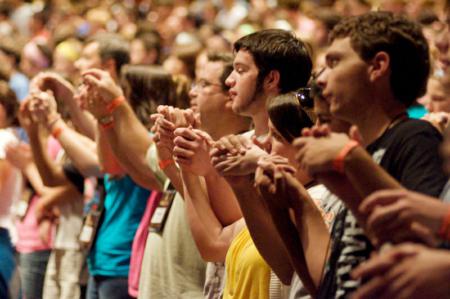Gestures and postures during Mass
Q. I recently joined a small parish where the entire congregation holds hands together at the Our Father. I feel uncomfortable holding hands with people I don't know; so instead, I put my hands in a prayer position as a signal to others not to grab for my hands.
There is no other parish close by, and I don't know how to handle this. (Charleston, West Virginia)
Q. Several priests and seminarians of our diocese have reminded the faithful that only the priest should have his palms raised and extended during the Lord's Prayer.
However, elsewhere in the country local customs persist. Most typical is that of joining hands with adjacent worshippers. Many end by raising joined hands after the doxology (the closing portion of the prayer.) Can you please clarify the preference of the [Catholic Church]? (Since your column reaches a broad audience, I am hoping that this will help to bring back some harmonization.) (Wichita, Kansas)
A. The two questions above reflect many that I regularly receive, and they demonstrate the continued angst over bodily gestures at Mass -- especially during the Our Father. And even though I answered a similar question in this column four years ago, that has not -- surprising as it may seem -- resolved the matter for all time! So let's try again.
One fact is clear: In response to a query about the correct congregational posture while the Our Father is prayed, the website of the U.S. Conference of Catholic Bishops says simply: "No position is prescribed in the Roman Missal for an assembly gesture." I take that to mean that, within reason, people are free to do as they wish.
If you want to raise your hands with palms uplifted, have at it. If you prefer to join hands with your family or a (willing) pew-mate, then do that. The General Instruction of the Roman Missal (in No. 42) says that, in the liturgy, "a common posture, to be observed by all participants, is a sign of the unity of the members of the Christian community."
That, however, gives no priest the right to impose a specific and universal gesture when the liturgical guidelines do not call for one. Surely the passion of some for uniformity and "harmonization" does not override everything else. More important, I think, is to leave worshippers free of anxiety and able to lift comfortably their minds and hearts to God.
Q. My wife and I were recently married, and we both feel strongly that we need to set a positive example in a secular culture, which seems to condone so much immorality (sex outside of marriage, contraception, abortion, etc.).
Our dilemma is that there is a really "nice" Catholic couple (recently engaged) in our circle of friends whom we love going out with. The problem is that, as we recently learned, they are cohabiting.
We feel that if we were to continue to socialize with them, we might be condoning immorality. How do we balance our friendship against the "sin of scandal"? Is it appropriate to cut off social ties with them until they marry or decide to live separately? In other words, how do we show them the love of Christ while still upholding the teachings of the church? (Atlanta)
A. Thank God for people like you and your wife, people willing to adhere to the church's teaching, which has guided Christians successfully and happily for many centuries.
Your issue now, though, is not so much one of morality as of strategy: What action by you and your wife can best help lead your friends to see the wisdom of the church's view?
It seems to me that if you were to cut off all ties with them abruptly, this could create resentment and entrench them more deeply in their choice of an immoral lifestyle. (By the way, not just the Catholic Church but many religions hold that couples should not live together as man and wife until they have made a religious and civil commitment that is formal and permanent.)
Why not, instead, take the courageous step of explaining to them, in a quiet and kind way, how much you enjoy their company but also how much the moral values of the church mean to the two of you and how it saddens you to see them stray from those values?
You could suggest to them that they will surely be looking for God's blessings throughout their marriage and that they might want to speak with the priest who will do their wedding about how to stay close to the Lord until that wonderful day arrives.
---
Questions may be sent to Father Kenneth Doyle at askfatherdoyle@gmail.com and 40 Hopewell St. Albany, N.Y. 12208.
- Father Kenneth Doyle is a columnist for Catholic News Service



















